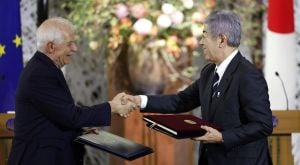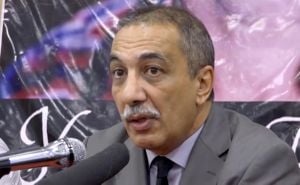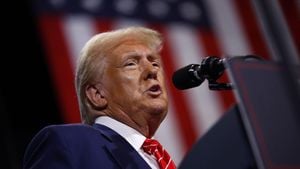Georgia witnessed unprecedented protests after the ruling party declared victory under controversial circumstances, leading to widespread allegations of electoral fraud. The protests unfolded dramatically, and tensions between the government and opposition escalated, echoing historical conflicts as the future of Georgia's political alignment hangs precariously in the balance.
Tens of thousands of Georgians took to the streets of Tbilisi, their voices ringing out against what they describe as the rigged results of the October 28 parliamentary elections, which saw the ruling Georgian Dream party claim nearly 54% of the vote. Their discontent culminated outside the parliament building, where demonstrators gathered to express their grievances against the perceived manipulation of the electoral process. The opposition, bolstered by President Salome Zourabichvili's support, asserted the legitimacy of their claims and organized the protests to challenge the ruling party's hold on power.
The roots of the protests were deep-seated, stemming from months of concerns where the opposition had long accused the ruling party of veering Georgia away from its pro-Western aspirations and closer to the orbit of the Kremlin. Zourabichvili herself stated, "We do not recognize these elections," condemning the voting process as riddled with malfeasance. Drawing from Russia's former tactics, she and the opposition leaders likened the government’s actions to a “Russian special operation,” pointing to the extensive use of deception and coercion to secure the electoral outcome.
Witness accounts revealed widespread incidents of vote-buying, intimidation, and alleged ballot-stuffing, which local election monitors claim skewed the results. The Organisation for Security and Co-operation in Europe (OSCE) acknowledged significant irregularities but refrained from outright labeling the elections as rigged. This hesitance, coupled with irregularities documented, stirred doubts across the political spectrum, prompting calls from the United States and the European Union for inquiries.
On Monday, the streets thrummed with the energy of dissent as supporters waved both EU and Georgian flags, chanting for justice. "We want legal elections," shouted Lasha, 22, standing resolutely among the crowd. A palpable sense of frustration hung over many, including Liza, 20, who cried for another election, declaring, "What we had was illegitimate!" They expressed thoughts of having been cheated, echoing broader sentiments of betrayal felt by those who had pinned hopes on the country's European integration.
At the helm of these protests, Zourabichvili rallied her supporters, vowing to fight for Georgia's European future. "This is not just about these elections, it’s about our values and our fate as part of Europe," she declared passionately. The outcry for international backing also reverberated, as she called for solidarity from Western allies, asserting the necessity of their support against what she deemed Russian influence over Georgian affairs.
Despite the swirling unrest, the ruling party staunchly defended its victory, insisting the elections were conducted fairly. Prime Minister Irakli Kobakhidze dismissed the allegations, claiming issues existed only at isolated polling stations, and reiterated the legitimacy of his government’s electoral win. He accused the opposition of undermining the democratic process and attempting to 'shake the constitutional order' of Georgia. His assertions, crafted amid mounting pressure from both opposition and international observers, reflected the tense atmosphere as the government prepared for potential escalations.
International reactions flooded in. The U.S. State Department echoed sentiments for investigations of alleged violations, with Secretary of State Anthony Blinken highlighting misuse of public resources, insisting these factors contributed to the uneven playing field. EU officials joined the chorus, branding the developments as evidence of democratic backsliding, linking Georgia’s prospects for EU membership to its commitment to electoral integrity. The EU's recent suspension of Georgia's membership application underlined the consequences of the elections on its European integration.
The backdrop of these protests is one of historical depth, with Georgia's turbulent relationship with Russia influencing its political canvass significantly. Russia’s aggressive stances over the years, especially its war with Georgia in 2008 and continuing territorial occupations, raise the stakes even higher. The Kremlin, for its part, has categorically rejected accusations of interference, branding them as unfounded. Kremlin spokesman Dmitry Peskov urged recognition of the elections as the rightful expression of the Georgian people's will, dismissing external suggestions of subterfuge as Western meddling.
Regional nuances added layers to the political narrative, with leaders like Hungary’s Prime Minister Viktor Orban throwing support behind the Georgian government, which many European allies viewed with skepticism. His visit during such tense times invited criticism, aiming to balance rhetoric on European aspirations with the allure of deepening ties with Russia.
The elections and ensuing protests reflect not just internal grievances but geopolitical tussles extending beyond national boundaries, with Georgia at the crossroads. Observers suggested the upcoming days would be pivotal, determining how this turbulent situation could reshape the political ideology of the country as the standoff continues. What will emerge from this confrontation? Will it catalyze change or merely prolong the existing cycles of unrest?
Meanwhile, the populace remains resolute, imbued with the spirit of defiance. Many Georgians are determined to challenge perceived treachery boldly, asserting their democratic rights. The sentiment is poised for change; whether through peaceful protests or institutional reforms, Georgia's quest to re-establish its footing within the European framework remains fiercely alive.
The populace feels cheated, frustrated, and, most significantly, determined not to let their aspirations vanish amid the political upheaval. With the call for international review and the demand for new elections echoing through Tbilisi's streets, it'll be fascinating to see how this narrative will progress. But one thing is clear: Georgians are ready for their voices to be heard, and they will not back down until they reclaim their political rights.



